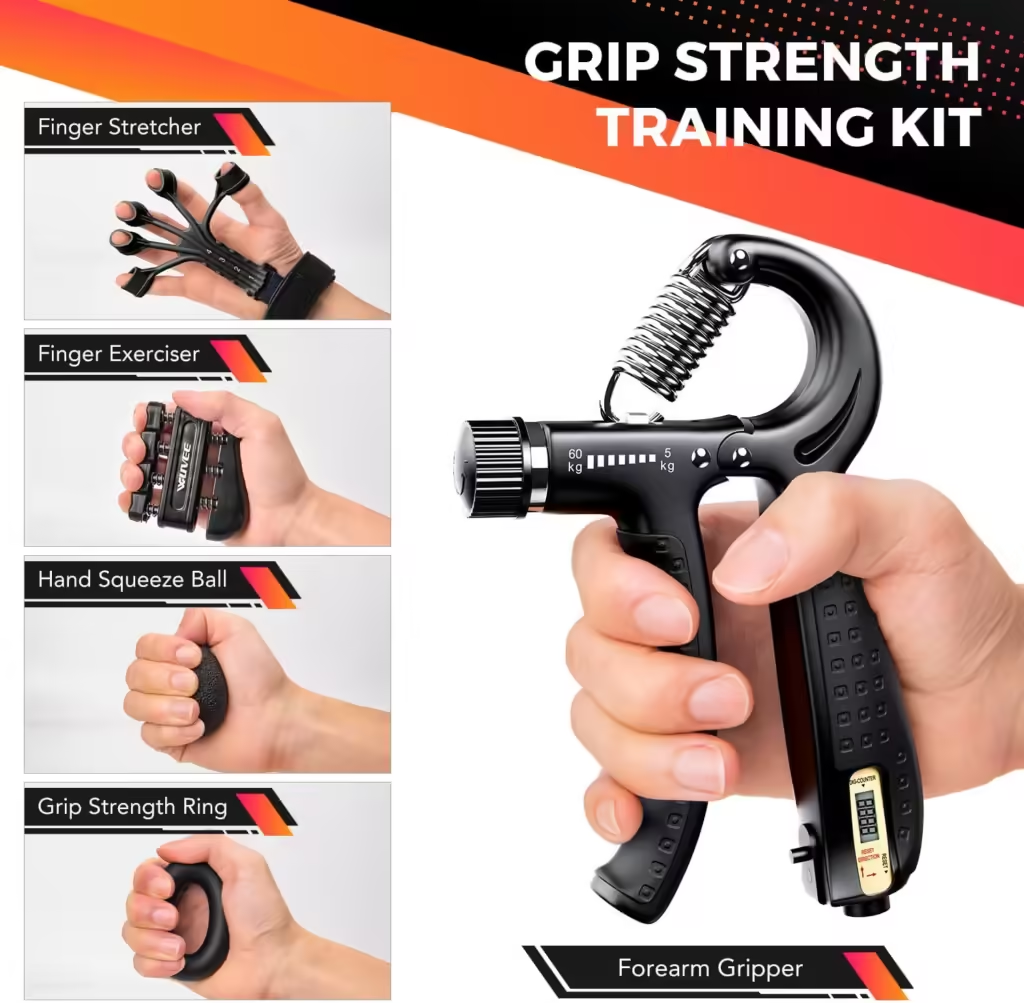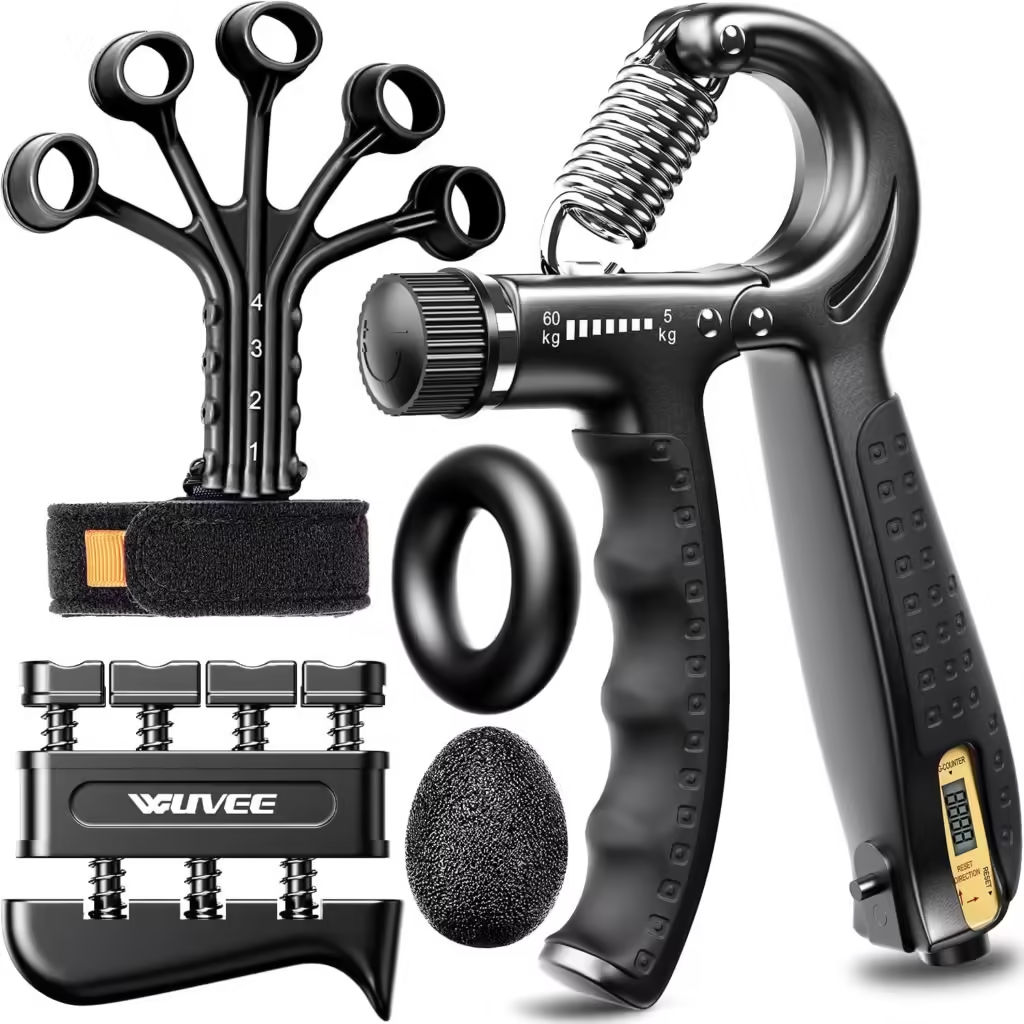Introduction: Finger Strengthener
Have you ever struggled to open a tight jar lid, carry heavy grocery bags, or perform precise tasks like writing or playing a musical instrument? A simple solution exists — finger strengtheners. These small yet powerful tools are designed to enhance the strength of your fingers, hands, and forearms, helping you tackle everyday challenges with ease. In this guide, we’ll explore everything you need to know about finger strengtheners, including exercises, benefits, and tips for maximizing your hand’s potential.
What is a hand strengthener?
A hand strengthener is a device or tool used to improve the strength, flexibility, and endurance of your fingers, hands, and forearms. They come in various forms, such as grip strengtheners, therapy balls, and rubber bands, each serving the purpose of enhancing the muscles that control finger movement.
Benefits of Using Hand Strengtheners
- Increased Grip Strength: Grip strengtheners target the muscles in your hands, wrists, and forearms, enhancing your overall grip strength. This increased strength is beneficial in daily activities and various sports, like rock climbing and weightlifting【7】.
- Improved Dexterity: Enhanced finger strength improves dexterity, allowing for more precise control over fine motor tasks such as typing, writing, or playing a musical instrument【7】.
- Better Joint Health: Regular use of finger strengtheners helps maintain healthy joints by increasing blood flow and reducing stiffness, which is particularly beneficial for individuals with arthritis or those recovering from hand injuries【6】.
- Stress Reduction: Similar to a stress ball, using a finger grip strengthener can help alleviate stress and anxiety. Squeezing motions can promote relaxation, making them an excellent tool for mental wellness【7】.
- Enhanced Daily Functionality: Stronger fingers make everyday tasks like carrying groceries, opening bottles, or gripping tools much easier. This improved functionality can greatly enhance the quality of life, especially in older adults【7】.
- Prevents Age-Related Decline: As we age, our grip strength naturally declines, leading to a reduction in daily function. Regular use of finger strengtheners can slow down this process, helping maintain independence【7】.
- Portable and Convenient: Finger strengtheners are small, affordable, and easy to carry, making them a perfect addition to your workout routine, whether at home, in the office, or on the go【7】.
Top Hand Strengtheners Exercises
Tennis Ball Squeeze
How to Do It:
- Squeeze a soft tennis ball as hard as possible for 5 seconds.
- Release and repeat 15-20 times with each hand.
- Perform this exercise 2–3 times a day【6】.
Thumb Bend
How to Do It:
- Hold your hand straight in front of you.
- Bend your thumb inward towards your palm and hold for 5 seconds.
- Repeat 10 times per hand. This exercise increases thumb flexibility and strength【6】.
Finger Extensions with an Elastic
How to Do It:
- Place an elastic band around your fingers and thumb.
- Open your fingers against the resistance of the band.
- Repeat 10–20 times, twice daily. This exercise helps to enhance finger spread strength and flexibility【6】.
Pinch Strengtheners
How to Do It:
- Hold a soft ball and pinch it between your fingers and thumb.
- Hold the pinch for 30–60 seconds and repeat 10–15 times on each hand【6】.
Grip Strengthener Reps
How to Do It:
- Hold a hand gripper in one hand, squeeze the handles together, pause, and slowly release.
- Perform designated reps on one hand before switching to the other. This exercise builds overall grip strength and endurance【7】.
Pronation/Supination Hammer
How to Do It:
- Hold a hammer by its handle, resting your forearm on a table.
- Rotate your wrist so your palm faces up and then down.
- Repeat 10–20 times on each hand, twice a day【6】.
MCP Flexion (Table Top)
How to Do It:
- Flex your fingers at the MCP joint without moving the wrist.
- Form a 90-degree angle between your fingers and palm.
- Repeat 10–20 times daily to strengthen finger flexor muscles【6】.
Tips for Using Finger Strengtheners Safely
- Start Slow: If you’re new to finger strengtheners, start with lower resistance and gradually increase as your strength improves.
- Avoid Overuse: Give your hands ample rest between workouts to prevent strain or injury.
- Proper Form: Keep your wrist neutral and avoid bending while using grip strengtheners.
- Warm Up First: Before any finger exercises, perform simple warm-ups like finger stretches to prepare your muscles.
Conclusion
Finger strengtheners are not just for athletes or musicians; they can benefit anyone looking to improve their hand strength, dexterity, and overall grip. Regular use of these tools can significantly impact daily life, from opening stubborn jars to improving performance in physical activities. Incorporate these exercises into your routine, and experience the benefits of stronger, more capable hands.
Whether you’re young or ageing gracefully, using finger strengtheners will keep your hands healthy, strong, and ready to tackle life’s challenges. So, grab a finger strengthener today and start squeezing your way to better hand health!
Frequently Asked Questions
What is a finger strengthener, and how does it work?
This tool is designed to improve the strength, flexibility, and endurance of the fingers, hands, and forearms. It works by applying resistance when you squeeze, stretch, or perform specific movements, targeting muscles that control your grip and fine motor skills.
Who can benefit from Finger Fitness Tools using it?
It can be used by everyone, including athletes, musicians, elderly individuals, and anyone looking to improve grip strength, dexterity, and hand function. They are especially useful for those recovering from hand injuries or dealing with arthritis.
How often should I use finger fitness tools?
For best results, it’s recommended to use finger strengtheners 2–3 times a week. However, beginners should start with shorter, less frequent sessions and gradually increase frequency as their hand strength improves. Always ensure rest periods to prevent overuse injuries(eMediHealth).
What are some common exercises I can do with a finger workout device?
Some popular exercises include the tennis ball squeeze, thumb bends, finger extensions with elastic bands, and grip strengthener reps. These exercises target different muscles in the fingers and hands, enhancing overall strength and dexterity(
Can Finger Fitness Tools help with arthritis?
Yes, finger strengtheners can help alleviate symptoms of arthritis by improving joint flexibility, reducing stiffness, and increasing blood flow to the hands. However, it’s important to use them under guidance, especially if you have severe joint conditions
Are Finger Fitness Tools safe for children?
Finger strengtheners can be used by older children under supervision, especially if they’re involved in activities that require strong hand coordination, like playing musical instruments. However, exercises should be adapted to their strength level, and they should avoid using high-resistance tools meant for adults.
Do finger workout devices help reduce stress?
Yes, finger strengtheners can act like stress balls. The repetitive squeezing motion can help reduce stress and anxiety, providing a calming effect. This makes them an excellent tool for both physical and mental wellness.
How do I choose the right finger workout devices?
When choosing a finger strengthener, consider your current hand strength, fitness level, and goals. Beginners should start with softer resistance tools like therapy balls or light grip strengtheners. Adjustable models are ideal for those looking to progressively challenge their grip strength.
Can finger strengtheners improve my performance in sports?
Yes, finger strengtheners are excellent for athletes involved in sports that rely heavily on grip strength, such as rock climbing, weightlifting, tennis, and golf. Enhanced grip strength can improve performance and reduce the risk of hand and wrist injuries (SET FOR SET).
What should I avoid when using finger workout devices?
Avoid overusing finger workout devices, which can lead to strain or injury. Pay attention to your form, keep your wrist neutral, and avoid excessive squeezing that may hurt your joints. Always warm up your hands with light stretches before starting your exercises.
For more detailed exercises and benefits, visit trusted sources such as eMediHealth and SET FOR SET
Related Posts
- Unlock Your Inner Power: A Complete Guide to Deity Pre-Workout
- Melissa Peterman’s Weight Loss Journey: Discover How She Shed the Pounds
- Children BMI Calculator (19 years or below)










